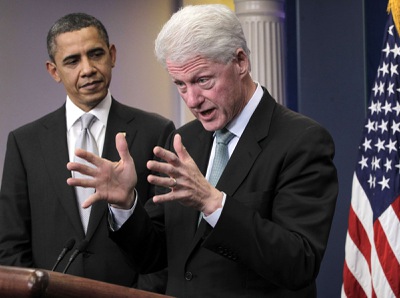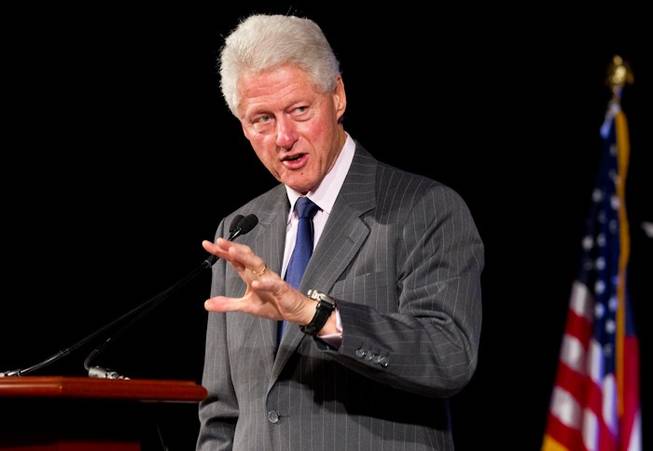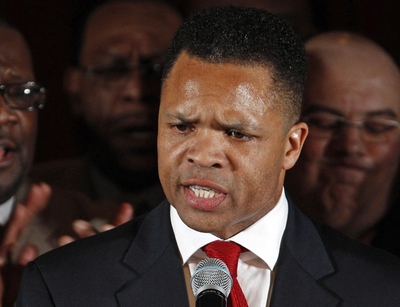Wednesday, Sept. 5, 2012 | 2 a.m.
CHARLOTTE, N.C. — He’s likable enough.
Barack Obama, in one of his more revealing public moments in 2008, expressed that sentiment about another Clinton. It also sums up, more or less, the way the current occupant of the White House feels about the last Democratic president to win re-election, William Jefferson Clinton.
When the pair get together, the former president does much of the talking, to Obama’s occasional annoyance. But it’s Obama who asks for all the favors.
BFFs they are not and probably never will be. But after a troubled beginning, the collaboration seems to be working. The two presidents have spoken a few times in the past few months, sources said.
And Clinton’s big Wednesday night speech — a prime-time slot usually reserved for the vice president — will be the most closely watched address of the three-day Democratic National Convention, second only to Obama’s stadium speech a night later. Its success is crucial for Obama, a deeply polarizing candidate who badly needs his more conservative predecessor’s clout as a validator among independent voters turned off by massive government spending.
The Rev. Jesse Jackson, who described the Obama-Clinton relationship as one with “up-and-down” moments, conceded the two probably don’t “watch ballgames together” even after their rapprochement. But he said their relationship is mutually beneficial, as the aftermath of the 2010 earthquake in Haiti shows.
“When the Haiti crisis came, he made Bill his spokesperson in a high-profile situation, and over time, he has continued to give Clinton access to him,” Jackson said. “So, at its root, there’s a huge respect for each other. ... Both of them gain from the relationship, and I think it’s wholesome. At least they’re not contesting each other publicly.”
Clinton — fiercely resistant to playing the marionette for any candidate, even his wife — seems more willing to follow the Obama script this time. He’s likely to include a passionate rebuttal of Mitt Romney’s claim that Obama is quietly rolling back Clinton’s landmark 1996 welfare reform bill, according to two Democrats close to the situation.
But true to form, Clinton, who was nearly booed off the stage during a rambling keynote at the 1988 convention, is working on the draft himself, in his chaotic longhand scrawl. The Obama team has been gently suggesting talking points — namely the bonds of competence that span the two Democrats over the Bush administration’s chasm of ineptitude.
Clinton is not even expected to submit a draft to his designated contact on the Obama campaign until shortly before showtime, several Democrats tell Politico. This is not an easy dynamic for an Obama campaign that insists on tight message control, but it’s par for the Clinton course — and as in golf, the former president bends the rules.
In 2008 — a much more strained convention for the two camps — Obama’s team insisted on seeing the speech, and it got it less than two hours before Clinton spoke.
This time, Chicago has few illusions of controlling Clinton — and Clinton’s top advisers are wary of Obama’s staff overusing the former president as a surrogate and fundraiser. Clinton’s team has committed to a succession of big-money events on behalf of Obama and the super PAC that supports him, Priorities USA Action.
But it hasn’t acceded to all requests made by Obama’s camp for new appearances. Clinton’s team will book his fall schedule after the convention, when Clinton can weigh it against his philanthropic commitments, people familiar with the situation say.
Like most of the other skirmishes between the two camps, this one has largely been waged by staff. The principals themselves are cordial, if not always entirely comfortable, in each other’s company. And they’re committed to beating a common enemy — even if a Romney victory, in theory, bodes better for Hillary Clinton’s prospects in 2016.
“They’re quite different in their skill sets, but they really complement each other in ways that are really important to this year’s election,” said former Ohio Gov. Ted Strickland, a former supporter of Hillary Clinton who became one of Obama’s most effective surrogates in the 2008 general election. “There is nobody who could be more effective as an advocate for the president’s policies than Bill Clinton.”
Another Democrat, close to both men, agreed but added a major caveat: “I think (Clinton) will be great, but it’s always this big high-wire act with him. If he says one thing out of sync with Obama, everyone will pounce. ... I don’t think that will happen, but it could be a huge problem.”
It’s not like it hasn’t happened already, though in less consequential settings.

In this Dec. 10, 2010, file photo, President Barack Obama listens as former President Bill Clinton speaks in the briefing room of the White House in Washington. When Bill Clinton takes the convention stage to endorse Barack Obama later this week, it will be a landmark step on a path to reconciliation for two former rivals whose political fortunes are now inextricably tied. By embracing Clinton, Obama hopes to capture the former president's uncanny knack for political survival against tough odds. And it doesn’t hurt that the economy and the nation’s budget picture last truly soared under Clinton.
During a television interview in the spring, Clinton questioned Obama’s attacks against Romney’s work at Bain Capital. In a rare mea culpa, Obama aides and Clinton’s staff successfully pressured Clinton to sign off on a statement saying he’d misspoken. Aides to the former president made a startling admission: Clinton may have made the mistake because he was “65 years old.”
Soon after, he stepped out of line again — suggesting in another TV interview that Obama should extend all Bush-era tax cuts, casting aside Obama’s adamant refusal to continue cuts for families making more than $250,000 a year. This time, Obama’s staff put him on the phone with Gene Sperling, a former Clinton aide who now serves as one of Obama’s top economic advisers, to explain the error of his pronouncement. Another walk-back ensued.
Even with the turbulence, Obama’s relationship with Clinton is the best it’s been since Obama was elected, people on both sides say.
That’s not to say the two men aren’t competitive — or that all past resentments have been forgotten.
Clinton, Democrats in his orbit say, would have appreciated a few more calls from the president asking for his campaign advice. Obama, for his part, doesn’t always appreciate the lectures Clinton delivers — to anyone, anytime — on topics ranging from foreign policy to the language of attack ads to the proper putting stance.
If there’s one particularly sore point, it involves David Axelrod, who had worked for Hillary Clinton on the 2000 Senate campaign in New York but hit her hard in 2008, according to the eBook “Obama’s Last Stand,” a joint collaboration between Politico and Random House.
The former president never quite got over Axelrod’s statements following the December 2007 assassination of Pakistani President Benazir Bhutto, who was close to both Clintons.
“She was a strong supporter of the war in Iraq,” Axelrod said at the time, speaking of Hillary Clinton, “which we would submit is one of the reasons why we were diverted from Afghanistan, Pakistan and Al Qaeda, who may have been players in this event today. So that’s a judgment she’ll have to defend.” CNN boiled that down to “Did Hillary Clinton kill Benazir Bhutto?”— and so did Bill Clinton.
Still, in 2010, Clinton made a string of appearances at the White House and helped congressional candidates in areas that were inhospitable to the current president. There also was the moment when Clinton urged Rep. Kendrick Meek to leave the Florida Senate race to give independent Charlie Crist a better shot.
Clinton went on to write a book about the economy, a tool that promoted himself and his policies but also defended Obama — making him, his supporters often note, one of the few Democrats openly defending the president during that time period.
Most important, perhaps, has been Clinton’s willingness to act as Obama’s surrogate to the party’s monied class, turned off by Obama’s Wall Street regulations and his strategy of attacking bankers to prove his middle-class bona fides.
At a late April fundraiser organized by Terry McAuliffe, Clinton made a point of telling the Obama people he would “do anything” they needed.
While Obama’s team prizes Clinton’s work on its behalf, it is a bit on edge over what he’ll say on the big stage at the convention.
It would like him to make a cast-iron connection between Obama’s economic policies and Clinton’s own, which led to record surpluses in the 1990s. It also would like a more emphatic endorsement of the president’s approach to the Bush tax cuts.
But the Obama team’s most pressing concern is how Clinton handles welfare reform, an issue that carries powerful cultural and political undercurrents of race, the role of government in people’s lives and fairness.
Clinton initially offered a less than full-throated defense of Obama from Romney’s attacks on the issue after Boston began running ads that claim limited exemptions granted to states from federal welfare-to-work requirements amount to a demolition of Clinton’s signature legislative achievement.
People close to Clinton say his growing aversion to Romney’s campaign — and his opposition to the deficit-slashing approach advocated by Romney running mate Paul Ryan — are pushing the two uneasy allies ever closer. The former president sees Ryan, a young party leader bent on changing Washington paradigms, as a fun-house mirror of himself, bent on undoing all the moderate reforms Clinton advocated as a 40-something president.
“I think (their relationship) is good and getting better is how I would describe it,” a longtime Clinton adviser said of the Clinton-Obama bond.
“There are a host of reasons. ... First is how Obama has treated Hillary. ... Beyond that, President Obama has reached out at important times. ... Third, the enemy of my enemy is my friend.”



Join the Discussion:
Check this out for a full explanation of our conversion to the LiveFyre commenting system and instructions on how to sign up for an account.
Full comments policy